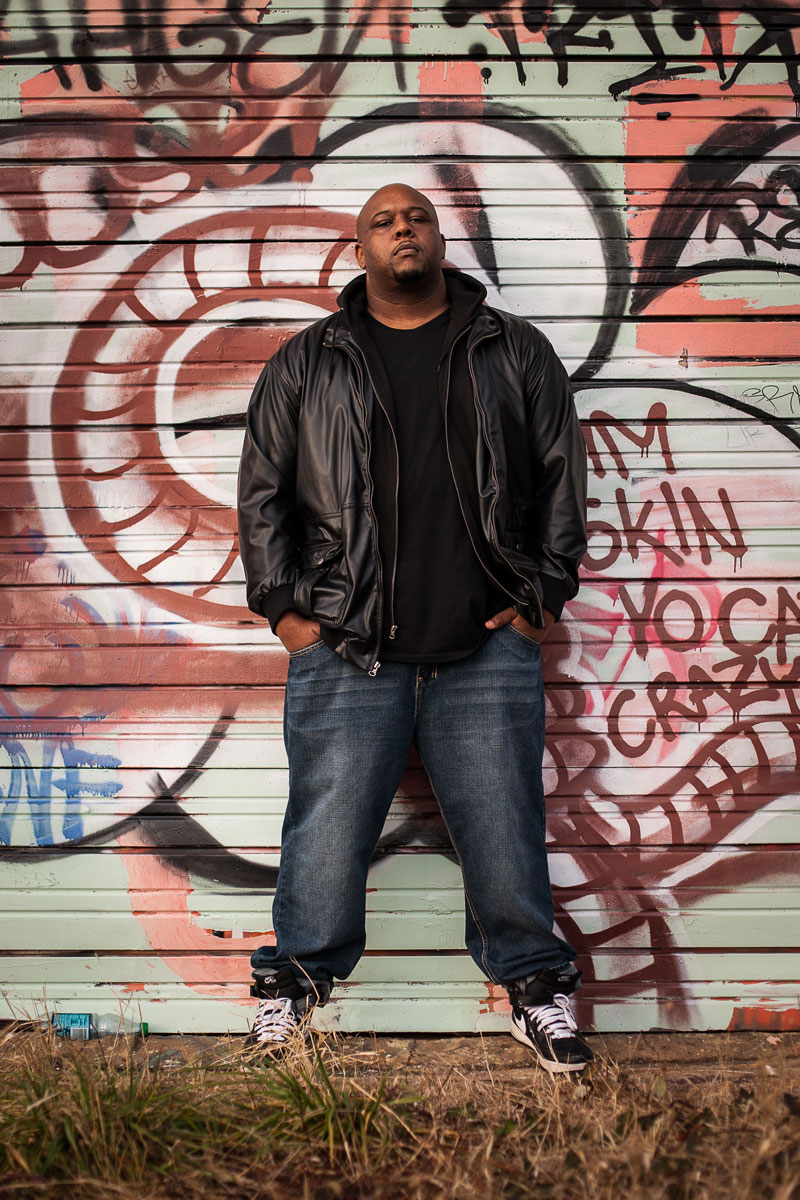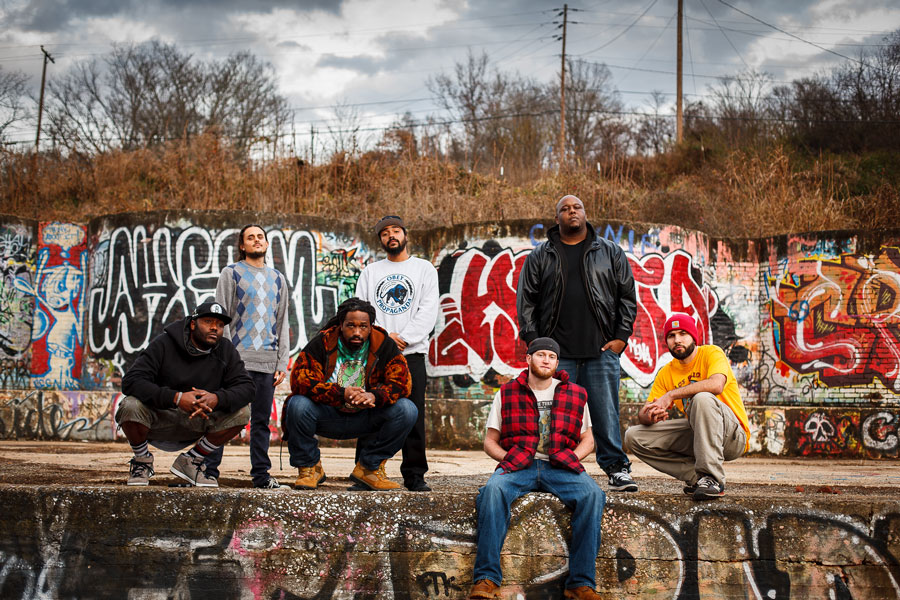Words from the wise
Michael Capra, better known to fans as Foul Mouth Jerk, has been a part of Asheville’s hip-hop scene since the late ’90s. As difficult as it can be for rappers to make a name for themselves in the city today, it was often even harder in the past, when hip-hop couldn’t shake its reputation for inciting violence.
As a member of Gurp City South and Granola Funk Express, Foul Mouth Jerk stands as one of Asheville hip-hop’s forefathers, a testament to perseverance in the face of an uninviting music community.
“When I was starting out in Asheville, there was no hip-hop scene,” Capra says. “The only rapper doing it live in town besides GFE was MC Huggs, and no clubs in town would allow rap acts on their stages. We had to build a following street performing, doing house parties with cats like DJ Rayvis (now Ray Mak) in people’s basements and such. Then we started getting spots on pirate radio and playing our own recordings and dirt hustling lo-fi four-track tapes. Eventually, we got some guest spots with non-hip-hop acts that liked what we were doing and let us rap with them for a song or two at their shows. That led to a couple clubs finally letting us get our own shows, and things built from there.”
Although hip-hop finds a more welcoming response in Asheville these days, rappers still have a lot of pressure placed on them to hone their craft in order to stand out. Foul Mouth Jerk has a few pointers for local artists looking to achieve the kind of longevity he has attained. “If I have any advice, it’s just to work crazy hard, build relationships and carve out your own lane,” he says. “Learn how to do publicity and promotion, booking and recording. And put on a kickass live show. And stop rapping over your own vocal tracks at the show — that shit sucks.” — MM
Multiplatinum Canadian hip-hop artist Drake likes to brag about how he started from the bottom. But for Drake, the “bottom” meant starring in Degrassi: The Next Generation and releasing mix tapes produced by Pharrell Williams and Kanye West.
Asheville’s music scene harbors an eclectic blend of electronic soundscapes, world music fusions and minimalist experimentation, but when it comes to hip-hop, the local scene has had trouble breaking out of the underground — the bottom, if you will. And whether local or not, hip-hop has been only marginally represented in large-scale music events in the area, such as Bele Chere and Mountain Oasis. A long-standing fear of violence at shows kept local rappers out of prominent clubs for years and still sometimes impedes these artists’ progress.
Despite all the obstacles, however, the Asheville hip-hop scene is packed with talented, ambitious rappers, producers and promoters possessing an unyielding passion for their art form. Most have lived in the area their whole lives, shedding immature delusions of grandeur for serious vision as they’ve honed their craft. Now, their hard work has begun to pay off as the stars align so local hip-hop can finally start getting the attention it deserves.
Veteran rookies
In the world of sneakers, “dead stock” refers to shoes a company purposely sets aside in mint condition so it can sell them years later for greater profit as a vintage item. When local rapper Hard Knox formed Deadstock Clique about a year ago, he used the concept as inspiration for assembling an elite crew of local rappers.
“I came up with the name, the whole swag, the concept of the whole Asheville music scene being so crazy and there being so much talent,” he explains. “Dead stock clothing is any brand or any item that comes out and gets put in a warehouse. That’s how I feel like we’ve been — just put in a warehouse, and now it’s time to bring that back out. We’re just a lot more expensive now.”
Deadstock Clique was “warehoused,” so to speak, because both Hard Knox and fellow band member Davaion “Big Dave” Bristol did prison stints for nonviolent, drug-related crimes. Hard Knox was released in 2010 and Bristol early in 2012. The time behind bars gave both of them a chance to reflect on getting serious about music.
“We’re a lot older than a lot of the guys who are out there trying to rap right now. We’re all in our 30s, or close to it, so that kind of sets us apart,” says Bristol. “We’ve got a different viewpoint on life because we’re a little older; we’ve had a few more life experiences. We might see the same thing, but because of the way we came up, we see it differently.”
Accordingly, both artists view Deadstock Clique as a much more serious project than their previous flirtations with hip-hop. Rounding out the group are local emcees A.R. Banks, T. Hugs Steel, Alpha Lee and Martin Snoddy; they all share a vision for expanding the Deadstock brand and conquering Asheville and the world beyond through their music.
“Some guys are like, ‘I just do it for the love.’ I love hip-hop, but I see that it’s an opportunity — that I’ve been given a blessing with a talent and a vision,” says Bristol. “Why just make music in a bedroom? Hip-hop’s been a business from the beginning. I don’t think there are any barriers to what we can do.”
Hard Knox says Deadstock Clique members have been careful not to rush the group’s development. The collective worked on tunes and on defining their brand for five or six months before releasing any songs or even putting their name out. Most of them remember when getting hip-hop shows in Asheville was next to impossible, so they understand that a little professionalism goes a long way toward establishing themselves in the scene.
“I sleep two or three hours a day. I’m constantly on the Internet, constantly finding new ways to progress the brand,” Hard Knox says. “It’s like for the last year we’ve just been building the brand and making sure we have some solid foundation. Now it’s time to get the people behind us.”
With ventures like Bristol’s “Open Door Radio Show” (which he runs with his brother Heath on Asheville Free Media) and his promotions company, Out Tha Gutta Entertainment, the group has made strides toward hyping itself — and the entire Asheville hip-hop scene. The group recently rented out a space it has converted into a small studio to record the band’s own projects and those of other local rappers.
Heath Bristol jokes that because some members had to take a step back and re-evaluate how to tackle the rap game after their time in prison, Deadstock Clique is made up of veteran rookies eager to take their music more seriously than ever before.
“Deadstock started off with the music, but it’s kind of like everything’s starting to branch out. We’re starting businesses and coming up with other ideas,” notes Hard Knox. “I guess a lot of people like to say the whole swag or style of things — the way we come across, the way we are in public — people want to be a part of that. … If you listen to our music and you ride to it, you feel like you’re a part of Deadstock.”

Double exposure
Not to disparage his skills behind the mic, but Jon Farmer may do his best work from behind the curtain, promoting and supervising the local hip-hop scene. Farmer, who speaks with the confident pace and tone of a true businessman, performs around town under his own name and also shoots and edits local videos as Blunation Films.
“I got really interested in photography and videography,” says Farmer. “I always had a vision of what I would want my own videos to look like, so I sold a really nice car I had to buy a camera.”
Lacking the money for film school, Farmer taught himself how to shoot and edit. “I kind of used YouTube as my school,” he says. “When I would get off work, I’d come home and consistently watch tutorials on how to do things.”
The results are impressive. Blunation Films has produced videos for local rappers like Mr. Say No Mo and regional artists like Atlanta’s Diamond, formerly of the hip-hop group Crime Mob. Farmer’s videos are thoroughly professional, yet his focus on Asheville-area locations maintains a local, independent vibe. And that, he says, is good news for struggling indie rappers.
“If you’re going to do something like that, this is a good city to start in,” Farmer maintains. “People here are very loyal to the independent spirit in anything — in business, in music.”
He compares local rappers with Macklemore and Ryan Lewis, whose single “Thrift Shop” became a smash hit after Seattle, their hometown, had fostered their growth without forcing them to turn to a major label. Farmer wants Asheville hip-hop artists to learn about the benefits of networking and self-promotion so they, too, can transcend the limits of the scene.
“When you package yourself professionally and present yourself to people, the perception is that you’ve been here before,” says Farmer. “When you don’t have professional images, when you don’t have professional sound quality, when your songs aren’t mastered or edited for radio or things like that, you give off the vibe that you’ve been stuck in first gear the whole trip.”
That’s what led Farmer to organize Roc the Mic, a Nov. 22 hip-hop showcase at Club Metropolis. Many local artists, including The Last Word Benders, Meana Shyy and Kain Lawson, competed for the grand prize: a free video produced by Blunation Films, four hours of studio time, a radio interview with Bristol and a $100 gift card. But it was another Asheville artist, Rose Royce Rique (now based out of Atlanta), who took home the prize.
Still, Farmer feels the competition offered plenty of benefits apart from winning.
“I had seen a similar showcase a couple of years back,” he recalls. “There was a group of guys that came here from Atlanta that said they were going to give away a record deal, and you can perform live in front of A&Rs for Sony, and everybody’s a winner. Well, that’s cool when you’re in kindergarten, but the reality of the world is that you can lose as good as you can win. It just shows you a lesson of what you need to do better next time. What I want artists to recognize is that it’s a good networking opportunity.”
Farmer worries that young rappers in the Asheville scene don’t realize how much effort it takes to get people to pay attention to them. The life of a hip-hop artist is not an easy one, and Farmer hopes people aren’t merely flirting with the rap game.
“Hip-hop is a very competitive art form, and there’s nothing wrong with that. But even in competition, there’s still room for you to grow,” he points out. “I think it’s a good opportunity for an artist that’s serious about his or her craft. I don’t want people to think this is some kind of jock competition. This is about exposure for everyone.”

The reigning champs
Not all of Asheville’s hip-hop talent has labored in total obscurity. With equal measures of talent and perseverance, two duos have scaled the summit of local hip-hop fame. In Xpress’ 2012 “Best of WNC” readers’ poll, CrazyHorse & Colston were named Best Hip-Hop Group, while that year’s second-place winner, Free Radio, claimed the top spot in this year’s voting.
Max Hupertz, better known as CrazyHorse, produces the duo’s music and believes their popularity may stem from their genre-transcending instrumentation.
“You don’t have to just like hip-hop to like our music,” he says. “I think it’s different in that we incorporate a lot of things that aren’t common for hip-hop. For instance, fiddle, harmonica — there’s some mountain elements to the music we do.”
Perhaps it was CrazyHorse & Colston’s nontraditional sound that allowed them to play Bele Chere the past two years. The festival had been notoriously reluctant to book hip-hop acts, but the duo won over promoters and fans alike.
“We had people come from Tennessee who said, ‘We just saw you guys last year randomly, and we came back up here to Bele Chere to see you guys play again,’” says Bryan Godleski, aka Colston. “We thought that was really awesome.”
CrazyHorse & Colston are now preparing to release a follow-up to 2012’s Backroads & Bonfires, and Hupertz and Godleski hint that the new album will have a more futuristic sound than Backroads’ laid-back Appalachian vibe. The duo also performed at Gemfest 2013, a Nov. 16 benefit at Altamont Brewing Co. for Xander Kai Valentin, a local 2-year-old with leukemia.
“We had a great response,” Hupertz said. “The place was at capacity most of the time. They had to ask people to leave before our show because there were too many people there.”
 Meanwhile, Johnny Reynolds and Austin Haynes of Free Radio feel the fact that they were born and raised in Asheville, and have made plenty of friends along the way, has contributed to their current prominence in the local scene. “We’re locals; we’re natives. We grew up in this town,” says Reynolds. “We’ve definitely felt the vibe for years, especially in hip-hop.”
Meanwhile, Johnny Reynolds and Austin Haynes of Free Radio feel the fact that they were born and raised in Asheville, and have made plenty of friends along the way, has contributed to their current prominence in the local scene. “We’re locals; we’re natives. We grew up in this town,” says Reynolds. “We’ve definitely felt the vibe for years, especially in hip-hop.”
Songs such as “Something in the Water,” an anti-fracking composition for which the group released a video this summer, have a less vapid message than most mainstream hip-hop offerings, notes Haynes. “People aren’t really used to it,” he says. “Most of the messages you get with rap music these days are associated with a lot of materialism — mindlessness, to a certain extent.”
Free Radio, though, isn’t resting on its “Best of WNC” laurels. In 2014, the duo plans to focus on playing shows and getting their name out more and more as they prepare a successor to 2012’s The Powers That Be.
They have recently added a full live band, featuring members of the Campaign 1984, Deadstock Clique and others. That fully fleshed-out Free Radio lineup performed at the Warren Haynes Christmas Jam Pre-Jam on Dec. 12, and was joined by Warren himself, Austin’s uncle.
“The crowd was a little older, and we were the first band that went on, so it took the audience a little while to kind of get used to us and see what we’re all about,” says Austin. “But I think a lot of people who were kind of skeptical for the first couple songs were jamming by the end. We definitely won them over.”
These groups’ success demonstrates that there’s an audience for hip-hop in Asheville. More and more venues are booking local rappers, and though the scene still has some growing to do, most of these local artists are confident that they possess the skill and determination that can take them to the top. Maybe Deadstock Clique will claim top honors in a future “Best of WNC” poll. Or perhaps the winner of Jon Farmer’s next Roc the Mic will produce a viral hit video.
But whatever the future holds, the Asheville hip-hop scene boasts an abundance of professional, forward-thinking, ambitious artists who are working hard to try to make a name for themselves. So keep your eyes — and ears — on the underground.
Learn more about Deadstock Clique at facebook.com/deadstockclique; Jon Farmer, Blunation Films and the Roc the Mic showcase at jonfarmernow.com; CrazyHorse & Colston at facebook.com/crazyhorseandcolston; and Free Radio at freeradio4all.com.
— Max Miller can be reached at nmiller@unca.edu.




2 thoughts on “Asheville’s hip-hop scene is poised to claim the spotlight”
Where’s philo?
AVL’S hip hop scene is a joke. Only reason Crazy horse and Colston are on top, is cus theres nuttin else to offer. Seriously, how much radio play are any of these wannabes getting? How many records are they sellin? Any of em signed to a label? Or have placements? No, they don’t. The express has to have somethin to write about tho. Ntm ever since bubba sparxxx dropped Deliverance they have been stuck in a time warp… tryin to copy that style. Crazyhorse beats are trash!